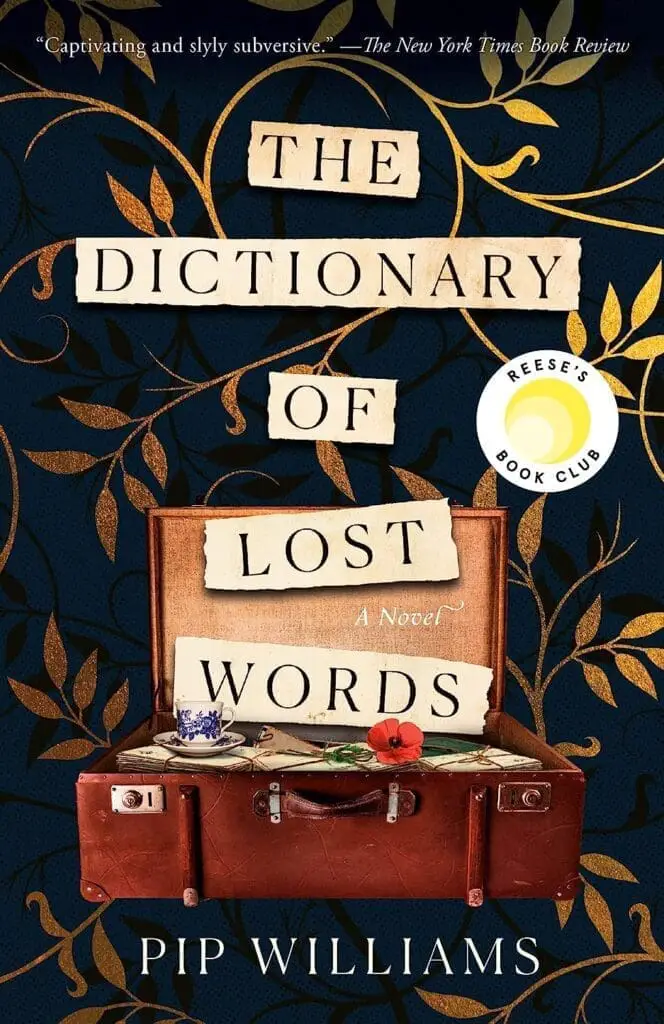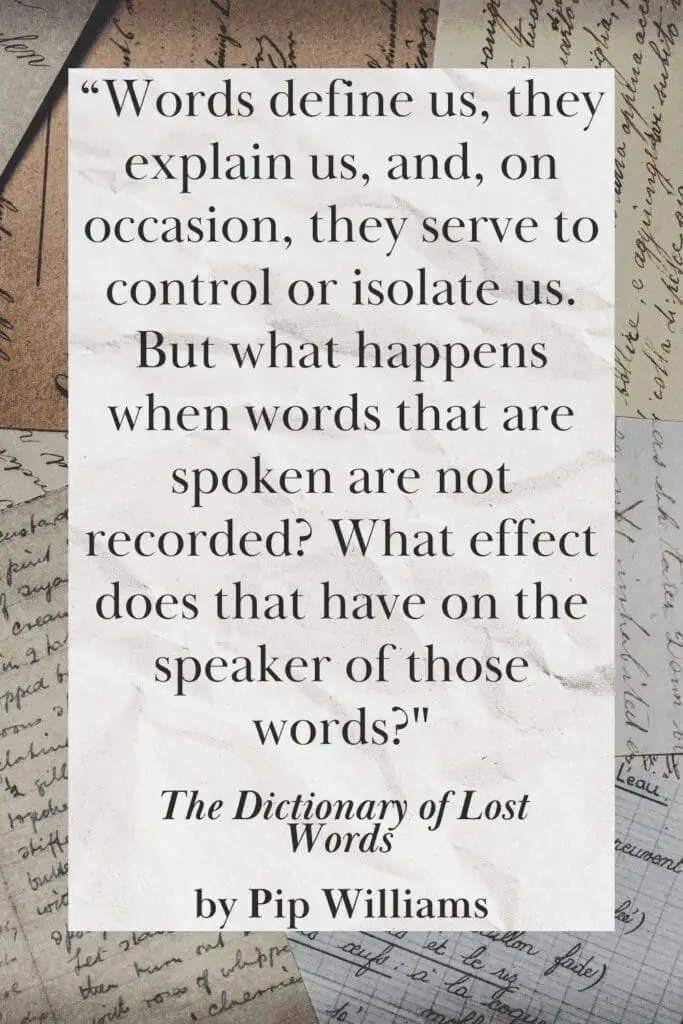“This novel is my attempt to understand how the way we define language might define us. Throughout, I have tried to conjure images and express emotions that bring our understanding of words into question.”
Pip Williams | Author’s Note (pg. 362) The Dictionary of Lost Words

This post may contain affiliate links, meaning if you click them I could earn a small commission at no extra cost to you. Thank you!
The Dictionary of Lost Words Quotes with page numbers.
18 Top Quotes from the Dictionary of Lost Words by Pip Williams
With Page Numbers
1. “Some words are more important than others—I learned this, growing up in the Scriptorium. But it took me a long time to understand why.” Prologue | February 1886
Part 1 | 1887–1896: Batten–Distrustful
2. “But when we talk about her, she comes to life.” “Never forget that, Esme. Words are our tools of resurrection.” pg. 24
3. “Words change over time, you see. The way they look, the way they sound; sometimes even their meaning changes. They have their own history.” pg. 25
4. “Me needlework will always be here,” she said. “I see this and I feel… well, I don’t know the word. Like I’ll always be here.” “Permanent,” I said. “And the rest of the time?” “I feel like a dandelion just before the wind blows.” pg. 33
Part 2 | 1897–1901: Distrustfully–Kyx
5. “It should not be, this word, I thought. It shouldn’t exist. Its meaning should be obscure and unthinkable. It should be a relic, and yet it was as easily understood now as at any time in history.” pg. 96
6. “Our thinking was limited by convention (the most subtle but oppressive dictator). Please forgive our lack of imagination.” pg. 97
Part 3 | 1902–1907: Lap–Nywe
7. “Words are like stories, don’t you think, Mr. Sweatman? They change as they are passed from mouth to mouth; their meanings stretch or truncate to fit what needs to be said.” pg. 127
8. “A vulgar word, well placed and said with just enough vigour, can express far more than its polite equivalent.” pg. 129
9. “The Dictionary is a history book, Esme. If it has taught me anything, it is that the way we conceive of things now will most certainly change.” pg. 135
10. “Without the vote nothing we say matters, and that should terrify you.” pg. 144
11. “Things are changing. Women don’t have to live lives determined by others. They have choices, and I choose not to live the rest of my days doing as I’m told and worrying about what people will think. That’s no life at all.” pg. 146
12. “When I was with her I felt I might do something extraordinary. With her gone, I feared I never would.” pg. 152
13. “I advise swearing. It will relieve the pain when it is at its worst, though you have to be convincing. Nothing half-hearted or under your breath. Shout it out. Childbirth is the only time you can get away with it.” pg. 180
14. “Some words are more than letters on a page, don’t you think?” she said, tying the sash around my belly as best she could. “They have shape and texture. They are like bullets, full of energy, and when you give one breath you can feel its sharp edge against your lip. It can be quite cathartic in the right context.” pg. 181
Part 4 | 1907–1913: Polygenous–Sorrow
15. “We can’t always make the choices we’d like, but we can try to make the best of what we must settle for. Take care not to dwell.” pg. 200
Part 5 | 1914–1915: Speech–Sullen
16. “It struck me that we are never fully at ease when we are aware of another’s gaze. Perhaps we are never fully ourselves. In the desire to please or impress, to persuade or dominate, our movements become conscious, our features set.” pg. 282
17. “The poets will see to that. They have a way of adding nuance to the meaning of things.” pg. 305
Epilogue | Adelaide, 1989

18. “Words define us, they explain us, and, on occasion, they serve to control or isolate us. But what happens when words that are spoken are not recorded? What effect does that have on the speaker of those words?” pg. 358
Ready to Read The Dictionary of Lost Words by Pip Williams?
If you enjoyed the quotes from The Dictionary of Lost Words by Pip Williams, be sure to also check out these posts:
Related Posts:
- 23 Top Memorable Quotes from Lessons in Chemistry by Bonnie Garmus (With Page Numbers)
- 20 Unforgettable Quotes from The Invisible Life of Addie LaRue by V.E. Schwab (with page numbers)
- 10 Memorable The Handmaid’s Tale Quotes from Margaret Atwood’s Dystopian Classic (with page numbers)
- 17 Striking Quotes From Where The Crawdads Sing (with page numbers) By Delia Owens

Your articles are a source of inspiration.